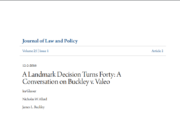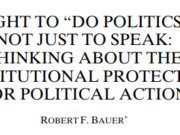In this article, Joel M. Gora examines the much debated Supreme Court decision in Buckley v. Valeo, which, in legitimizing money spent to influence elections as a constitutionally protected form of speech, upheld a bevy of speech-stifling campaign finance regulations, including federal limits on campaign contributions to candidates. In his analysis, Gora notes that the effect of these contribution limits has been to aid the incumbency advantage in elections. In addition, Gora finds fault with the failure to raise federal contribution limits since they were originally enacted then-25 years prior, completely neglecting inflationary market trends. This article continues by extensively highlighting the manner in which campaign finance laws have consistently failed to achieve their goals. Since its publication in 1999, Gora has concluded that the easing of restrictions on political parties is the best route to a more efficient and effective political system. Furthermore, although he offers support for a moderated system of taxpayer financed campaigns in this article, Gora has since reversed his opinion and no longer supports taxpayer financed elections due to their ineffective and partially unconstitutional nature. Nevertheless, this powerful review of the Buckley v. Valeo decision illuminates the negative consequences it has had on political participation in American elections.














